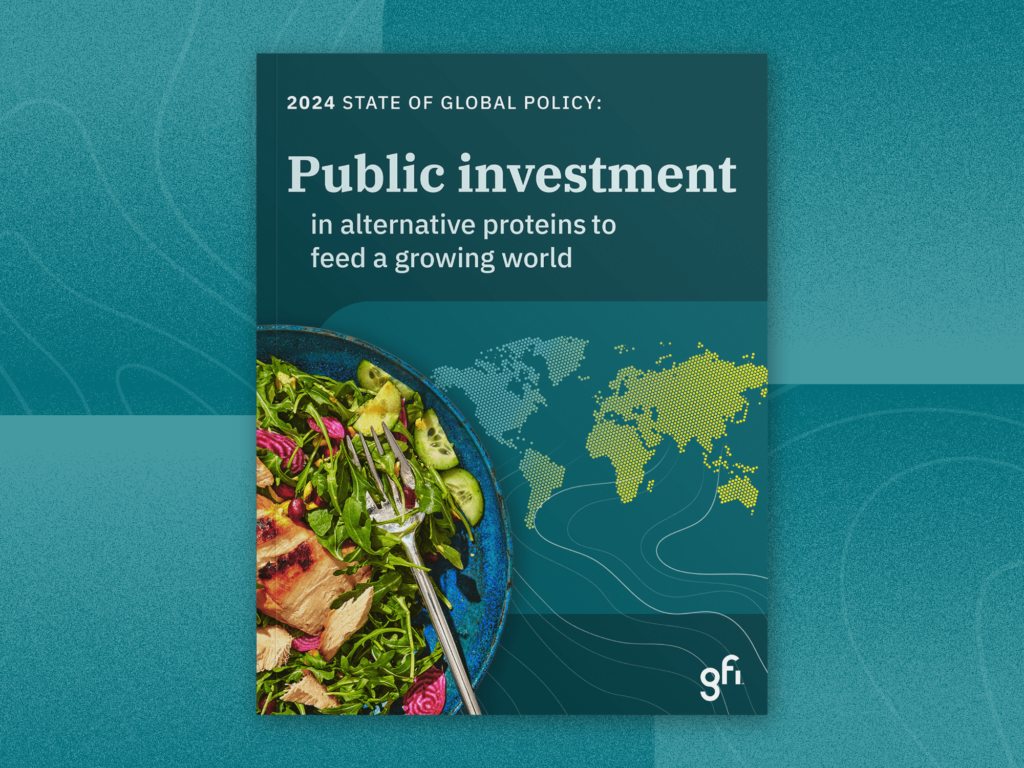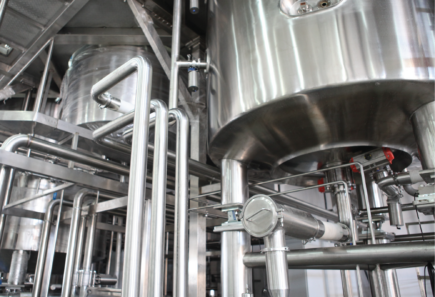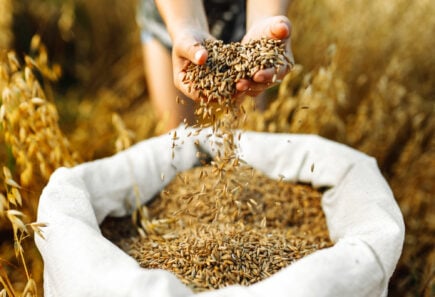
Key alternative protein policy resources
We’ve put together an informative suite of resources, written by both our Policy and Government Relations team and global partners, to help keep you informed on the latest innovations in alternative proteins, the state of global policy, and the legal and policy solutions that address urgent threats to our food system.

Resource
The State of Global Policy: Alternative proteins
Our annual State of Global Policy report tracks public investment in alternative proteins and showcases the actions governments take to position themselves as leaders in the field.

Fact sheets
Our fact sheets give you everything you need to know in a bite-sized package and reflect the latest in alternative protein policy thinking. These resources are helpful for a high-level overview of the field or a deeper dive into a particular issue.

Boosting food supply chain resilience
Using proven biomanufacturing methods like fermentation to produce protein can help ensure a stable food supply during supply chain disruptions.

U.S. loan and guarantee programs for scaling alternative proteins
Discover federal loan and loan guarantee programs that may be used to support alternative protein manufacturing and investment.

California: Sustainable protein innovation
Explore our fact sheet to learn about the state of sustainable protein production in California, including recent industry and research developments.

Americans understand plant-based meat labeling
Research shows that a large majority of American adults understand what plant-based meat products are based on current labeling.

Recommendations for President Trump: Building an innovative agricultural bioeconomy
The United States must restore its leadership in biotechnology and biomanufacturing. Investment in food biomanufacturing R&D will bolster agricultural innovation.

How alternative proteins expand opportunities for farmers and agriculture
Explore our fact sheet to learn how alternative proteins support farmers, expand opportunities for agricultural livelihoods, and help create a healthy, resilient agriculture sector.

Alternative protein innovation bolsters national security
Alternative protein technologies produce meat with high efficiency, providing fortification for our food system and defense against growing threats.

Federal research grants for alternative protein companies
Explore our overview of the SBIR and STTR programs, which provide grants to U.S.-based small businesses to support the commercialization of scientific research and innovation.

Alternative protein food industry survey: Startups
Discover key insights from our 2024 survey on the alternative protein food industry. This summary highlights crucial findings from manufacturers, investors, retailers, and more, providing strategic considerations for navigating the…

Environmental impacts of alternative proteins
Explore the environmental advantages of alternative proteins in diversifying the global food supply. With minimal land and water use, lower GHG emissions, and reduced pollutants, investing in alternative proteins ensures…

Defense Production Act: The Department of Defense should invest in food biomanufacturing to advance national security
As DoD invests $1 billion in biomanufacturing, GFI recommends prioritization of biotechnology-based food production under the Defense Production Act Investments Program.

Farm Bill: Centers of Excellence for Alternative Protein Innovation
The 2023 Farm Bill should recognize and fund at least three Centers of Excellence that focus on alternative proteins.

Farm Bill: Alternative protein R&D within AFRI
Including alternative proteins as a research area within AFRI would ensure funding eligibility and fuel breakthroughs that lead to economic benefits.

Cultivated meat’s regulatory pathway
The FDA has completed its first safety evaluation for cultivated meat. What comes next? Learn more about cultivated meat’s regulatory path to market.

Alternative proteins for a sustainable, secure, and prosperous future
Alternative proteins create a path to a sustainable, secure, and prosperous future. Policymakers should prioritize investments to improve the quality, affordability, and accessibility of alternative proteins.

An overview of food label censorship
Label censorship, which prohibits the use of meaty terms on alternative protein products, is anti-free market, unconstitutional, and unnecessary.

The First Amendment right to use clear labels on food
Alternative protein producers have a First Amendment right to describe their products in a clear manner consistent with consumer expectations.

The United States should prioritize public investment in alternative proteins
Publicly funded research on alternative proteins will benefit the American economy, food security, and consumers.

Cultivated meat LCA and TEA: Policy recommendations
See key findings from and policy recommendations based on CE Delft’s life cycle assessment and techno-economic assessment of cultivated meat.

White papers
GFI’s featured white papers explore the benefits of alternative proteins in detail, building on the latest research and global developments to make the case for protein innovation to meet anticipated demand. From American competitiveness in the global agricultural economy to food security to climate benefits, learn more about how alternative proteins help solve looming challenges.

Policy brief: CDMOs for Food and Agriculture Biotechnology Development
CDMOs in biotechnology for food production create jobs, boost the bioeconomy, and provide outsized support to American farmers, innovators, and consumers.

Alternative proteins ensure American competitiveness
Plant based foods have gained momentum and notable market share. Read our report explaining why the U.S. should build up a domestic alternative protein industry.

Alternative proteins are a global food security solution
Amid a global grain shortage and skyrocketing food prices, alternative proteins can make the global food system more efficient and resilient.

Climate benefits of accelerating global production of alternative seafood
This white paper explores how plant-based and cultivated seafood could fill the growing seafood supply gap while mitigating climate change.

The biodiversity benefits of alternative seafood
This paper explores how plant-based and cultivated seafood could fill the growing supply gap while minimizing impacts on biodiversity.

A global protein transition is necessary to keep warming below 1.5°C
Learn why alternative protein innovation is crucial to meeting the Paris Agreement temperature target and how we can accelerate progress.

Partner resources
Alternative proteins are growing in prominence as a solution to global challenges and opportunity for a growing world. These resources from GFI’s partners and allies contain compelling research, modeling, and reporting that position alternative proteins as a priority for policymakers and entrepreneurs.
The Breakthrough Institute: Public Financing for Agricultural Decarbonization and Abundance
This report advocates for increased public funding for agricultural technologies, including alternative proteins, as a key strategy to meet climate goals and increase agricultural growth.
What’s cooking? An assessment of the potential impacts of selected novel alternatives to conventional animal products
The UN Environmental Programme underscores alternative proteins’ promise for the environment, public health, and animals, and presents a wide range of supportive policies for global leaders to consider.
CSIS: Mitigating Risk and Capturing Opportunity: The Future of Alternative Proteins
This report from the Center for Strategic & International Studies details the importance of plant-based and cultivated meat as tools to increase food security and build a food system that is more resilient to climate change, antimicrobial resistance, and global instability.
Climate Advisers: Reducing Methane Emissions from Food and Agriculture
This review of the opportunities to reduce agricultural methane emissions finds that investing in alternative proteins is among the most powerful mitigation strategies available.
ClimateWorks Foundation: Global Innovation Needs Assessment – Protein Diversity
This assessment explores the potential economic benefits of alternative proteins and quantifies the level of investment needed to achieve optimal results.
The Breakthrough Institute: The Case for Public Investment in Alternative Proteins
This report lays out the best arguments in support of federal investment in research, innovation, and partnerships to advance the field of alternative proteins.

Protein Innovation Nation Newsletter
Protein Innovation Nation is a monthly newsletter covering local and national updates around public research funding, regulation, legislation, and labeling. Hear the latest on key market updates, new reports, and opportunities at GFI.
Support our work
Our alternative protein research, insights, and advocacy are made possible thanks to our generous, global family of donors. Philanthropic support is vital to our mission. Connect with us today to discuss how you can help fuel this transformative work.

